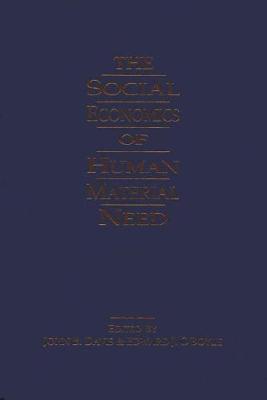Political & social economy
1 total work
The Social Economics of Human Material Need
by John B. Davis, John Bryan Davis, and Edward J O'Boyle
This collection of seven essays, a project of the Association for Social Economics, challenges the conventional paradigm of mainstream economicswhich rejects human need as a viable conceptand seeks to establish a new paradigm grounded in human material need under its two distinct aspects: physical need and the need for work as such.
In the Introduction, John B. Davis maintains that mainstream economic theory denies that needs can be distinguished from wants and so does not recognize the importance of this dimension of economic life. He argues that it is virtually impossible to discuss the economy without addressing the individuals, families, and communities whose needs go unmet and who thus become the focus of social and economic policies.
The contributors establish in their essays a philosophical and methodological foundation to explain the nature of need and its centrality to economics. They present a new socioeconomic paradigm based on human material need, which is presented in the context of the three principles that organize economic affairscompetition, cooperation, and interventionand which is underlaid by the social values of freedom, community, and equality. Essayists strive to incorporate the duality of human naturethe recognition that every human being is at once an individual and a social beingin their definition of human physical need and the need for work. They further address unmet individual material need through private- and public-sector remedies.
The essays include "Need as a Mode of Discourse," by Warren J. Samuels; "The Person and the Social Economy: Needs, Values, and Principles," by Peter L. Danner; "Human Physical Need: A Concept That Is Both Absolute and Relative," by Edward J. O Boyle; "Government Participation to Address Human Material Need," by Anthony E. Scaperlanda; "The Need for Work as Such: Self-Expression and Belonging," by Edward J. O Boyle; "Social Management and the Self-Managed Firm," by Severyn T. Bruyn; and "Reconstruction of Mainstream Economics and the Market Economy," by John B. Davis and Edward J. O Boyle."
